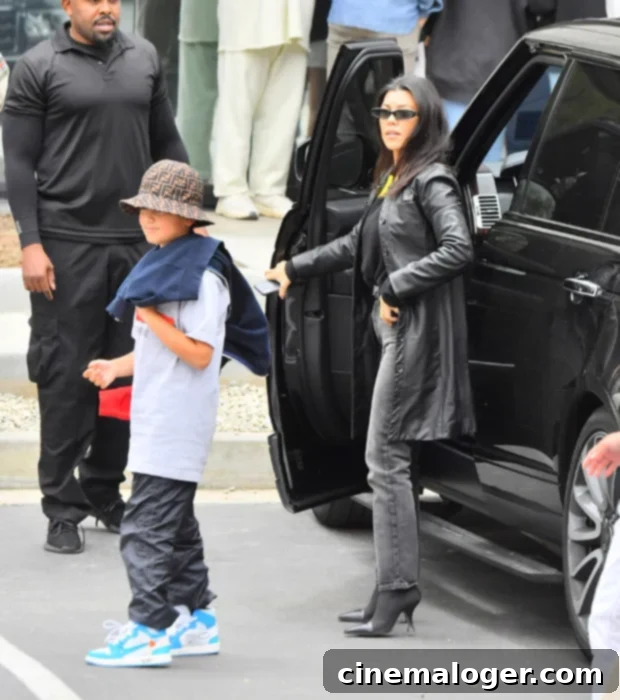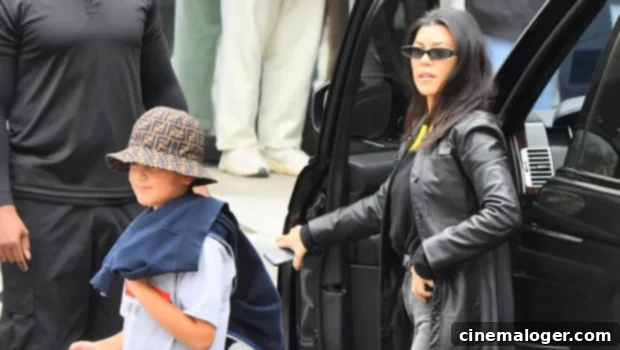Kourtney Kardashian’s Urgent Plea: Protecting Mason Disick from Relentless Social Media Impersonators
The digital age, while connecting us in unprecedented ways, also presents unique challenges, particularly for public figures and their families. This reality was starkly highlighted when reality television icon Kourtney Kardashian took a firm stand against the alarming trend of online impersonation. Her target? Individuals creating fake social media accounts, ruthlessly pretending to be her 12-year-old son, Mason Disick.
On Thursday, July 21st, Kourtney utilized her powerful platforms—Instagram Stories and Twitter—to address what she described as a persistent and deeply unsettling issue. For months, she had hoped that the obvious falsehood of these profiles would be apparent to her vast following. However, as the fake posts continued to circulate and gain traction, it became clear that a direct intervention was necessary to dispel the rampant misinformation and protect her son’s identity and privacy.

Kourtney’s Explicit Message: Shutting Down the Impersonation
Kourtney’s message was unequivocal and delivered with a sense of urgency and exasperation that resonated with her fans. “Hello everyone, hope it is a beautiful Thursday,” she began, setting a deceptively calm tone before launching into the heart of the matter. “After months and months of thinking you would all know that is NOT Mason on these fake accounts, some of you don’t. So I will spell it out clearly: that is NOT Mason on these fake social media accounts talking about our family.”
This direct declaration was crucial. The implication was that the existence of these accounts wasn’t just a minor annoyance; it was actively confusing followers and, more disturbingly, being taken seriously by some. Kourtney’s decision to “spell it out clearly” underscored the gravity of the situation and her determination to leave no room for doubt.
Beyond addressing her fanbase, Kourtney also issued a pointed request to news outlets and media organizations. She implored them to cease using these fabricated accounts as legitimate sources of information regarding her family. The spread of unverified rumors through seemingly credible channels only serves to amplify the damage caused by impersonation, making her plea a critical call for journalistic integrity in the face of rampant online gossip.
Before concluding her powerful statement, Kourtney delivered a chilling message directly to the individual or individuals behind these accounts: “And to the person relentlessly pretending to be Mason, ultra ultra ultra creepy.” The triple emphasis on “ultra creepy” conveyed the profound discomfort and alarm she felt. This wasn’t merely a prank; it was a disturbing invasion of privacy and a psychological imposition on a child’s identity, highlighting the potentially sinister undertones of such online behavior.
The Catalyst: False Rumors and Family Gossip
The immediate trigger for Kourtney’s public outcry appeared to be a series of sensational posts shared just a day prior by a social media account purporting to be Mason. These posts made startling claims, notably alleging that Kourtney’s younger sister, the renowned entrepreneur Kylie Jenner, was not only planning to marry her long-time partner and baby daddy Travis Scott but also that she was the central figure at a supposed bridal party. Such claims, if left unchallenged, could have spiraled into widespread misinformation, affecting not just Kylie and Travis but the entire Kardashian-Jenner clan.
It’s easy to understand why Kourtney felt compelled to act swiftly. For a family whose lives are constantly under public scrutiny, the dissemination of false personal news, especially originating from an account impersonating a minor, is profoundly problematic. It not only creates unnecessary drama and confusion but also forces the real individuals to constantly clarify or deny fabricated stories, taking focus away from their actual lives and endeavors. The thought of her 12-year-old son being unwittingly associated with such high-profile gossip, especially regarding his aunt, was clearly an intolerable prospect for the protective mother.

A Recurring Pattern: Mason’s Past Encounters with Social Media
This isn’t Mason Disick’s first brush with the complex world of social media, nor is it the first time Kourtney has had to step in. In 2020, when Mason was just 10 years old, he managed to create his own Instagram account. However, this venture into the digital realm was short-lived, swiftly curtailed by his vigilant mother.
Kourtney publicly explained her decision in March 2020, revealing the careful thought she and Mason’s father, Scott Disick, had put into the matter. “He started an Instagram yesterday and didn’t ask us,” Kourtney stated at the time. “I did delete it because Scott and I just felt like… He’s 10! I think, on Instagram, the thing that really worries me is the comments. People can be so mean.”
This earlier incident provides crucial context to her current stance. It demonstrates a consistent and well-considered approach to protecting her children from the potential perils of online exposure, especially the often-harsh and unfiltered commentary found in social media comment sections. Her concern wasn’t about stifling his creativity but about shielding his young mind from the negativity and judgment that can come with public online profiles.
However, like many resourceful children navigating the digital landscape, Mason found a clever workaround to re-engage with social media following the Instagram deletion. He quickly pivoted to TikTok, hosting a Q&A session. During this session, a curious fan inquired about the fate of his original TikTok account. Mason candidly explained that it “got deleted because [he] was ‘too young.’” This highlights the platform’s age restrictions and the ongoing challenges parents face in monitoring their children’s online activities.
The Broader Implications: Celebrity Children and Digital Privacy
Kourtney Kardashian’s battle against Mason’s impersonators is more than just a celebrity anecdote; it reflects a broader societal challenge concerning digital privacy, identity theft, and the protection of minors online. In an era where a significant portion of our lives is lived digitally, the ease with which individuals can create fake profiles and spread misinformation is a growing concern.
For children of celebrities, this issue is amplified. They are born into a world where their lives are often public property, yet as minors, they lack the full capacity to consent to this exposure or defend themselves against its downsides. Parents like Kourtney are thus placed in the difficult position of balancing their own public lives with their children’s fundamental right to privacy and a safe upbringing, free from the psychological distress of impersonation or online bullying.
The “ultra ultra ultra creepy” description Kourtney used is particularly poignant because it touches upon the deeply unsettling nature of someone relentlessly trying to embody a child’s online persona. It can lead to psychological discomfort, a sense of vulnerability, and a potential for malicious intent, even if the immediate objective is merely to spread gossip. This incident serves as a stark reminder for all social media users to exercise critical thinking and verify sources, especially when encountering sensational claims, and for platforms to enhance their mechanisms for identifying and removing impersonating accounts.
Conclusion: A Mother’s Unwavering Protection
Ultimately, Kourtney Kardashian’s firm stance underscores her unwavering commitment to protecting her son. From deleting his early Instagram account to publicly calling out current impersonators, her actions consistently demonstrate a deep-seated desire to shield Mason from the darker, more invasive aspects of celebrity and the digital world. As technology continues to evolve, so too must our vigilance in safeguarding personal identities, particularly those of children, ensuring that online spaces remain as safe and authentic as possible. Kourtney’s plea serves as an important reminder for fans, media, and platform providers alike: respect for privacy and truth remains paramount.
